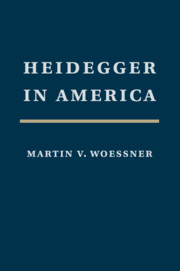Book contents
- Frontmatter
- Contents
- Preface
- Introduction: Being Here
- 1 Freiburg Bound
- 2 Exiles and Emissaries
- 3 Nihilism, Nothingness, and God
- 4 An Officer and a Philosopher
- 5 Dasein and das Man
- 6 The Continental Divide
- 7 Richard Rorty and the Riddle of the Book that Never Was
- 8 Ethics, Technology, and Memory
- 9 Culture Wars
- Conclusion: Being There
- Index
- References
6 - The Continental Divide
Heidegger between the Analytic and Continental Traditions in American Philosophy
Published online by Cambridge University Press: 04 February 2011
- Frontmatter
- Contents
- Preface
- Introduction: Being Here
- 1 Freiburg Bound
- 2 Exiles and Emissaries
- 3 Nihilism, Nothingness, and God
- 4 An Officer and a Philosopher
- 5 Dasein and das Man
- 6 The Continental Divide
- 7 Richard Rorty and the Riddle of the Book that Never Was
- 8 Ethics, Technology, and Memory
- 9 Culture Wars
- Conclusion: Being There
- Index
- References
Summary
But neither faction of the philosophical divide – Anglo-American or continental – can claim to be on the side of the angels.
Richard KearneyPhilosophers have never been immune to name-calling. Occasionally, however, their domestic disputes have relevance beyond the seminar room and the department lounge. In these instances, the quarrels of professional thinkers are windows onto much larger intellectual and cultural phenomena; they reveal that philosophy, far from being removed from the world in which it is pursued, stems in fact directly from it. Even when philosophers conceive of their work in the most abstract and (politically) neutral terms, their ties to the larger world around them occasionally catch and reflect the historical spotlight, like fishing strings suspending talent-show angels in midflight. At first glance, philosophers seem to float free of the world entirely, but look again and one might glimpse the tethers that keep them in place.
Heidegger was a polarizing philosopher in the twentieth century. His legacy divided his profession into two antagonistic camps – so-called analytic and continental philosophies, respectively. Consequently, a good many of the profession's quarrels had to do with him and his work. If Heidegger cannot be seen as the cause of the continental/analytic split, he certainly served as its most frequent point of contention. Disputes about academic philosophy's place and purpose were often disputes that touched upon his work. Such disputes show no sign of abating.
- Type
- Chapter
- Information
- Heidegger in America , pp. 181 - 210Publisher: Cambridge University PressPrint publication year: 2010

